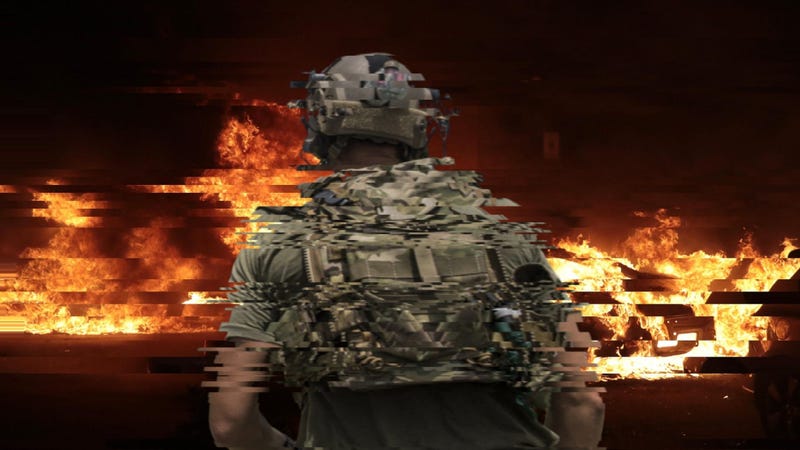
It was one of those rowdy parties that we all joined Special Forces to be a part of.
We had a day room where we would watch bootleg DVDs, drink cheap Kurdish whiskey, and on occasion, the younger guys on the team would play Rockband on their Xbox with two Green Berets on guitar and another on drums.
We were on FOB Sykes in Tal Afar, Iraq in 2009 and in-between training and missions we had a hell of a good time. At this particular party, my team sergeant put on a DVD he brought with him from home called "End Game." I still remember the cover on the DVD case. It was a skull superimposed on the United Nations building in New York City.
“Blueprint for global enslavement,” the words on the cover read.
There was no such thing as streaming back then, so every day we would be on the hunt for new movies to watch. Every day we would go to the small PX on the base and every day they would have the same DVDs. Excitement would ripple through our camp when someone found a new knock-off DVD at the local market. I guess that is why we were happy to spin up this strange "End Game" DVD that night -- at least it was something new to watch.
I remember sitting there, completely engrossed in it. A contractor we knew sat with us, commenting that yeah, the stuff about the Rothschilds was true, and sooner or later we will have a global currency. The documentary got even darker, spinning a vision of global elites who plan to exterminate the human race. I asked my team sergeant if I could borrow it a few days later so I could watch it from beginning to end.
He was happy to oblige, and although I don't think either of us thought of it this way, my team sergeant was red pilling me.
Looking back on it now, of course, this wasn't my first fascination with conspiracy theories. As far back as I can remember, I have always been interested in things like UFOs, Sasquatch, ESP and the like. Mostly, this took the form of harmless speculation and fantasy. I loved Arthur C. Clarke's television show "Mysterious World" as a kid.
When I joined the Army though, I encountered guys in Ranger battalion who believed some strange stuff. They read books by David Icke, and had “Behold a Pale Horse” kicking around the squad area at work. Some of them passed around VHS tapes made by a Christain evangelical who talked about dinosaurs and man living together as if baby Jesus rode on the back of an adolescent triceratops.
This was around 2004 and a relative of mine gave me a burned copy of “Loose Change” on a CD to watch. I didn't know what to expect, but it was a documentary produced by a couple of college kids saying that the U.S. government launched the 9/11 attacks. According to them, everything we were told about that day was a lie.
While so many things about the "9/11 Truth" movement were absurd, “Loose Change” chips away at the edges of your understanding of reality. They have experts, they call themselves architects and engineers for 9/11 Truth, who pull on various threads of the 9/11 narrative in a hyper-technical way that undermines what you think you know. What about building No. 7? How can cell phones possibly even work on an airplane in flight? These questions could get under your skin after a while if you do not have satisfactory answers.
Holocaust deniers work the same way. They can't deny that the Nazis waged genocide against six million Jews, but what they can do is engage in hyper-technical debates about where the ovens in Auschwitz really were, contradicting historians and making people doubt the official narratives they are told about the holocaust.
And years later, so did "End Game," a documentary produced and directed by someone I'd never heard of before, a Texas-based radio host named Alex Jones.
These are the on-ramps. These are the red pills that lead Americans to some very dark places.
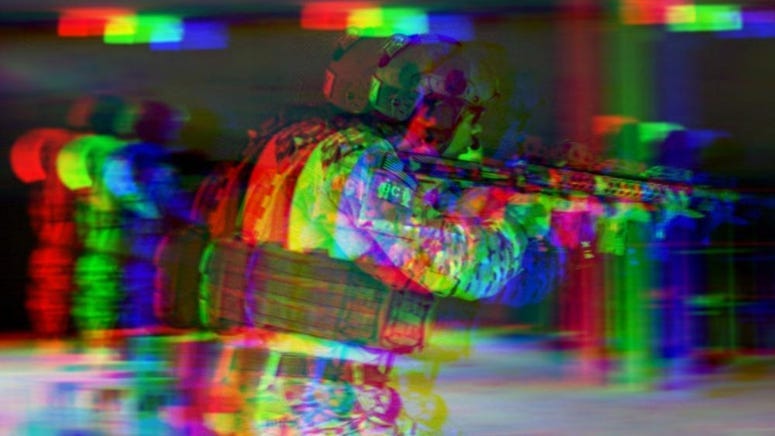
Although I was admittedly fascinated by these grand unified theories of conspiracy that seemed to explain hidden undercurrents and evils in our world, I eventually rejected their insinuations and baseless inferences. Yes, smaller criminal conspiracies can exist, be it Iran-Contra or the Jeffrey Epstein network, but those facts are not proof that some mega-conspiracy lurks behind the scenes.
With this in mind, I have noted how obsessed my fellow military veterans get with conspiracy theories. I've been intrigued, to say the least, seeing how rational soldiers trained to collect military intelligence and analyze it easily accept these theories without any factual basis. When decorated Special Forces soldiers who served during the Cold War are openly posting on social media about how then-President Barack Obama was a secret Muslim communist while Russian President Vladimir Putin is a strong leader and defender of Christianity, you can see how their minds have been completely captured by conspiratorial propaganda.
And so I watched the rise of QAnon and the many veterans that it drew in with increasing interest over the last several years.
First, what is QAnon? Mainstream media seems to have discovered this sprawling network of conspiracy theorists in just the last month or so, but various iterations of what we now call Q have been around for a long time.
In 2017, an anonymous user of the 4chan message board calling himself QAnon began posting vague information about how Hillary Clinton would soon be arrested and that President Donald Trump was leading some sort of secret task force to target evil deep-state operatives. The information is always vague, intentionally so, allowing adherents to the conspiracy to project whatever they like into it.
QAnon is another attempt to tie the world's evils together in a grand unified conspiracy theory. Internally, those who follow Q debate the particulars of the unified field theory of conspiracies. But the gist is that there is supposedly a cabal of globalist pedophiles who worship satan and that Trump and the U.S. military are leading the charge towards what they call “the storm,” a messianic moment similar to the rapture in which all the bad people are rounded up, arrested and executed for high crimes.
The supposed deep-cover intelligence operative leaking secret details on 4Chan started in 2017, but before QAnon there were posts by FBIAnon and CIAAnon. I would argue that someone may have been beta-testing their messaging to see what worked and what didn't before QAnon showed himself. Who is Q really? Some have pointed toward a group of professional puzzle makers or more recently Army veteran Jim Watkins. Possibly, Q was started by the former and then taken over by the latter, but we don't have all of those answers yet. It seems that Q was started as a Live Action Role Playing game that got away from its creators and mutated into something else entirely.
Before all that, there was Pizzagate. The crazy idea spawned from leaked DNC emails which falsely claimed that Hillary Clinton and John Podesta were running a pedophile ring out of the basement of Comet Ping Pong, a pizzeria in Washington D.C.
Of course, before Pizzagate there was 9/11 Truth, the aforementioned conspiracy that told us to ignore the vast majority of experts and to put our faith in diligent internet sleuths who had access to a search engine and were using Google to uncover dark hidden truths. We can continue tracing this back to the satanic panic of the 1980s, when a not-insignificant portion of our country was worked into a frenzy over the false accusation that a daycare center had secret tunnels under it Satanists used to kidnap and ritualistically abuse children.
You might think these varying conspiracy theories are unrelated, but you would be wrong. Just as fashion repeats itself every few decades (I'm waiting for bellbottoms to come back again any day now) conspiracy theories are recycled and reused. QAnon integrates the satanic panic of the 80s with the amateur internet sleuthing of 9/11 Truth in combination with other conspiracies that go all the way back to the John Birch society warning of “internationalists,” which is just another word for what people today call “globalists.”
Why do you think Hollywood makes the same movies over and over, giving us reboots and sequels into infinity? It's because the producers know that the format works and that people will buy it. Previous conspiracy theories were beta tests for future conspiracy theories. Bellbottoms will come back again one day, and I even saw an interview with the mother of a soldier on Fort Hood who had been murdered talking about how there were tunnels under the base.
Deep down, we all want to believe that education solves ignorance, that intelligent people are not racists, antisemites, or conspiracy theorists. This is a very dangerous fallacy. It is learning the wrong lesson from history.
Special Operations soldiers are considered to be the best of the best. These guys are alpha males, physically fit, mentally tough, with above-average intelligence and problem-solving skills who are specially selected and highly trained to square off with the enemies of our nation.
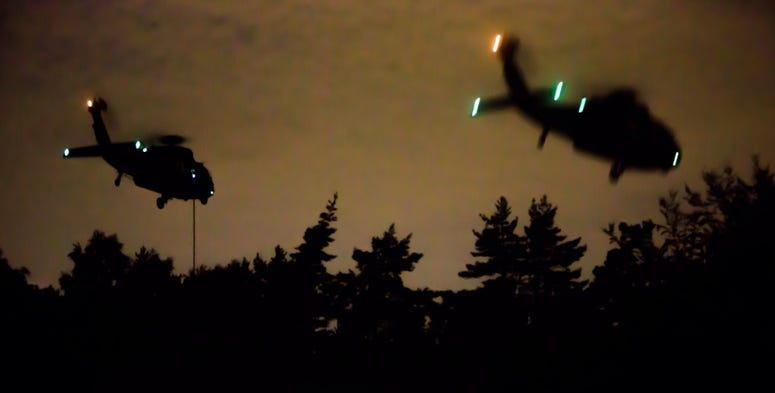
What I notice is a psychological process that veterans go through when they leave the military. It mimics the stages of grief in some ways. When I say veterans, let me use the term “we” rather than “they” because there is no they, there is only us. I'm not any better than anyone else who struggles after their military service.
Every year, another generation of veterans is discharged from the military, and I see more young faces going through the same process I did. The anger, frustration, even paranoia, much of it played out in self-righteous and self-indulgent social media posts.
Veterans fall into conspiracy theories because they are trying to make sense of a world that fundamentally does not make sense. As Scottish psychologist R.D. Laing wrote, “Insanity -- a perfectly rational adjustment to an insane world.” Veterans are particularly at risk of paranoid delusions because of their unique backgrounds and sudden loss of a social network.
Something I want to be clear about here is that there is no evidence of some secret QAnon veteran strike force out there. While I'm disturbed by how many ex-Green Berets and ex-Navy SEALs have been taken in by Q, it is a small minority of our community. They are a concerning minority, but not the norm.
However, while hardcore QAnon adherents are not common among Special Operations veterans, the paranoid style of American politics is. When it comes to wild conspiracy theories about George Soros, Hillary Clinton, the deep state, COVID-19 being a hoax, and secret plots to undermine America, they are as common as the day is long among Special Operations veterans.
Many of these deep-state George Soros conspiracies are -- once again -- nothing more than recycled conspiracy theories from the past which held that Jews (Soros) are secretly undermining society and that they are going bus the Blacks (Antifa) from cities to your suburbs. A faked social media post making this claim had the phone ringing off the hook at my local police station a few months ago.
A lot of that material is lifted straight out of "The Turner Diaries" and Matthew Bracken (an ex-SEAL) novels. Turn the clock back five years, and these same people believed ISIS was coming to middle America to install Sharia Law. Turn the clock back another ten years and these same people believed there were secret Al Qaeda training camps hidden all across America.

Take for instance my team sergeant in Iraq giving me a copy of "End Game." I loved and respected him, and here he was telling me that a globalist cabal was trying to tear down America and that our government did 9/11. He was giving me permission to go down that rabbit hole, and I went at least halfway down it.
I've seen more than my fair share of Special Operations veterans don a boonie hat, grab a D-cell flashlight, and go exploring those dark tunnels under the daycare center, searching for satanic pedophile rings or, failing that, searching for an aesthetic, something to hang on to. Frantically, they shine the yellow beam of their flashlight around the tunnels, looking for a new identity to replace the one they lost when they left the military.
But why do we as veterans buy into these delusions so easily? I believe I've identified a few main themes:
1. We see the world through a lens of good versus evil. In the military, and through the culture which got us there, we cast ourselves as the heroes in our own story. We are the American paratroopers killing Nazis on D-Day, we are the Marines who fought communists at Hue City, we liberated Kuwait, we killed the terrorists in Afghanistan. We are Mel Gibson overhanding a tomahawk into a Red Coat during the American Revolution. We're the good guys, and you're with us or you're against us.
But what of the nuances, you say? Isn't the world more complicated than this?
Fuck that, the world consists of black and white, gray areas are just a place for cowards to hide. This isn't just a childish line of military propaganda, but rather a feature of how the U.S. military raises soldiers. How else could young men be compelled to go hit targets and risk their lives night after night, year after year, for the last two decades?
2. We don't recognize reality, because we never really lived in it. Most of us joined the military as teenagers and the male brain doesn't finish developing until they are in their mid-20s. We joined not just a branch of service, but a subculture. In the case of the Marines and Rangers, one could argue we joined a cult.
This subculture comes complete with its own hierarchy, its own lingo that outsiders can't understand, its own clothing line, promotion system, and it is self-contained on bases that are isolated from civilian populations with their own shops, movie theaters, hospitals, dining facilities and schools. When deployed overseas, we are even more isolated from the country we are charged with protecting. Because we are soldiers fighting a war, we are completely convinced that our normal is the “real world” of life and death, while the mundane reality of life for most Americans back home is fake and artificial.
When we get out of the military, we enter into a country that we never knew because we were just kids when we joined. For however many years served, the soldier's mind is essentially loaded into a time capsule and buried. When veterans get out, they don't recognize the country they fought for or the people in it because we never had the chance to know them.
Veterans also discover that no one really gives a fuck about the war that they thought was so important. This is incredibly mentally and socially destabilizing for a young man.
3. As veterans, we want to belong to something bigger than ourselves. We want to be the Ranger that scaled the cliffs at Pointe du Hoc or the Marine that raised our flag over Iwo Jima. Although beyond the scope of this op-ed, Americans, in general, are desperate to find a tribe and to view themselves as being on the right side of history.
Everything about our Special Operations units reflects that we are part of a legacy, standing on the shoulders of those who came before. Joseph Campbell pointed to the importance of belonging to a tribe and tribal initiation ceremonies for young men. Special Operations is one of the last places in American culture which provides this sense of initiation into manhood complete with purpose and fraternity.
4. Every year, the War on Terror gets harder to justify and we are all looking to regain some pride and self-respect in the aftermath of two failed wars. The fact of the matter is that our military presence in the Middle East doesn't make sense to any of us. We don't have a strategy, we've never had a strategy, and yet everyone is seemingly OK with this. The war drags on across three administrations more or less unhindered and there has been very little concern for what the downstream social effects of this will be for veterans and America overall.
Because the war ceased to make sense to us a long time ago, soldiers fill that moral void with iconography from the past, be it Spartan warriors or Templar Knights. After they leave the military, veterans search for a new iconography to fill that void and to backstop their own experiences in combat in order to fill them with meaning rather than defeat.
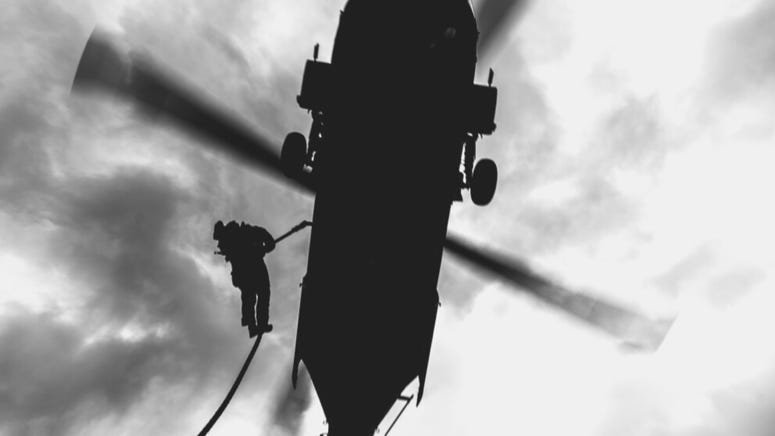
For some veterans, QAnon and similar conspiracies solve the above dilemmas. It checks all the boxes. You get to be part of a movement with like-minded people, you're fighting evil in a worldview that you have become comfortable with. Now you know why you don't recognize America, not because you had a silly preconception of it from the beginning, but rather because it has been undermined by a satanic cabal.
It is heartbreaking to see some of my fellow Special Forces veterans sink to these toxic depths. They post on social media advocating for war and murder. Ostensibly, this fictional war is against pedophiles who none of us want to live on the same planet with anyway, but the problem is that these guys are openly talking about serving as judge, jury and executioner for fellow Americans.
Anyone who served on the Special Operations Task Force has stories about us hitting the wrong targets night after night. How accurate was our intel? What was our success rate? History will be the judge as documentation is declassified, but I'm guessing it was about 50%.
I'm going out on a limb here, but the average vet bro with full sleeve tattoos and half a can of Copenhagen in his lip is more likely to murder “pedophiles” based on QAnon conspiracies rather than vetted intelligence information compiled by professionals. God help us the day one or more of them actually act out this juvenile fantasy. Some veterans seem desperate to bring the war home with them if for nothing else than to maintain their relevancy in life.
But we may not be quite as clever as we think we are.
William Gibson writes about us in his novel "Zero History."
“What you need to remember, with these guys, is that they don't know they're con men. They're wildly overconfident. Omnipotence, omniscience -- that's part of the mythology that surrounds the Special Forces ...Your guy can walk in the door and promise training in something he personally doesn't know how to do, and not even realize he's bullshitting about his own capabilities. It's a special kind of gullibility.”
These veterans post about “the storm” and “the great awakening.” They use hashtags like #WWG1WGA (Q's motto: "Where we go one, we go all") or put three stars in their avatar representing retired Gen. Michael Flynn who recently posted a video in which he took the QAnon oath.
It's not just vet bro stereotypes that fall in with QAnon, there are retired colonels and generals involved now as well. Conspiracy theory, including QAnon, is pervasive all the way up the chain of command. A friend of mine recently sat in a work conference with Army officers who were casually discussing the Wayfair conspiracy, which falsely claims that children are trafficked by stowing them in furniture shipments, as if this was actually true. If you really believed this, why wouldn't you do something about it?
I've decided not to post screen grabs or name and shame these people. I've identified a small but concerning number of Special Operations veterans involved in QAnon and many more who are adjacent, espousing similar conspiracies but not yet advocating QAnon by name.
My prerogative is not to shame or scold but simply to ask veterans to snap out of it. There is research to suggest that directly confronting and shaming cult members is counter-productive. It causes them to double down and dig their heels in.
This is why our messaging has to be: "Hey, conspiracy vet bro, we love and respect you, but will you please wade out of the swamp and rejoin us in America now?"
One of those veterans is my team sergeant. He went through some tough times after retiring from the Army but his team, myself included, was always in his corner trying to encourage him to pull through. He jumped onboard with QAnon as it emerged and even tried to become a QAnon political candidate running for office. His social media feed was a nonstop mental vomit of conspiracy theories.
When he posted a picture for his political campaign featuring a left-wing politician with a camera reticle over her face, looking quite a bit like a sniper's crosshairs, I texted him and told him he needs to knock it the fuck off or he was going to get into trouble with the FBI. He assured me that everything was under control, that it was all part of his brilliant plan, that there was a reason for what he was doing. You see, it is all a part of the four-dimensional chess game.
That was the last time I communicated with him.
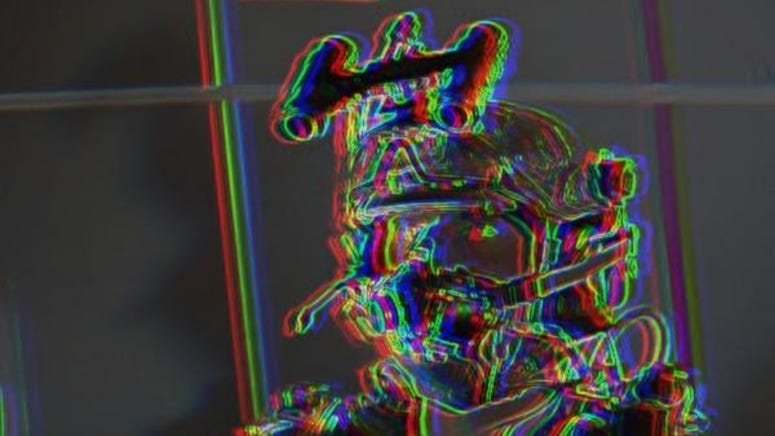
I noticed that he broke with QAnon a few months later over some ideological differences causing him to lose faith in them. That's a good sign, and yet, his Twitter account proclaims him to be at war against evil, that globalists want depopulation (the theme of the "End Game" documentary), and says that he is a part of some secret task force he made up. A link leads to a bunch of Alex Jones videos.
For many Americans currently enraptured with QAnon, there will be something that comes after Q just like there is for my former team sergeant. As described above, these conspiracy theories never really go away, they just mutate or they pull a fade only to reemerge years later.
Years ago I read "Secret Societies" by Arkon Daraul. It's dated and has some errors, but there is a chapter about the mystery schools that really stood out for me. In ancient Rome and Greece, the mystery schools were dedicated to pagan gods and members of their cult would undergo a process of initiation.
During the initiation, Romans and Greeks would be subjected to food and sleep deprivation, physical exertion, and in some cases hallucinogens. Daraul argues it's not any particular belief system held by the schools that's important, but rather the methodology used to convince initiates that they had an epistemological experience, that they truly witnessed something supernatural. This was the glue that bound the initiates to the occult beliefs of the schools.
The specific conspiracy theories espoused by QAnon are irrelevant, as is their lack of factual accuracy in this case. QAnon's regurgitated conspiracy theories are hardly interesting, but Q has pioneered a new mythology, a new participatory narrative framework, to create a copy that never had an original, a simulacrum born onto the internet. Now that this template exists, others will replicate it, blending in their own messaging in the process.
Who those actors will be and what ideas will be carried by this new transmission medium into the minds of Americans, including veterans, is impossible to know but it is not hard to see the QAnon model being used by terrorist groups or foreign intelligence services to create chaos in America's future. It would be the perfect weapon with built-in plausible deniability.
QAnon's messianic message of “the storm” is not building towards a Jonestown moment with magic Kool-Aid, or catching a ride on the Hale-Bopp comet. Rather, “the storm” represents an epic battle against evil here on earth, one that the faithful may get tired of waiting for.
While the vast majority of veterans will never buy into such nonsense, much less act on it, the few who do will find one another on social media networks and begin to plan.
They may have already.
